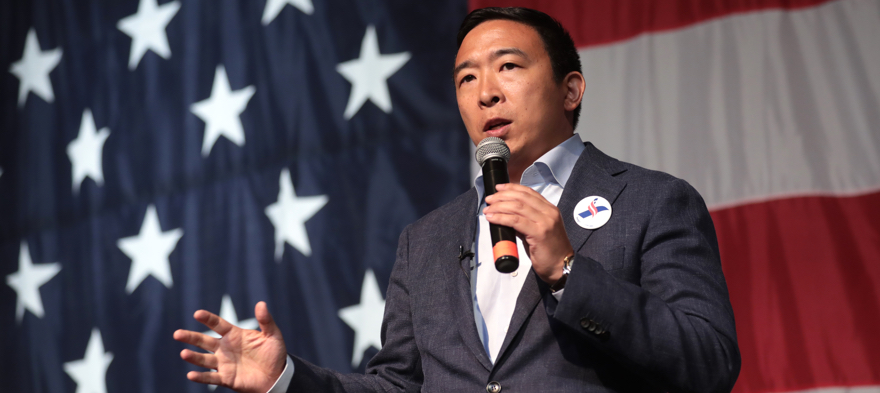
Education voters—people for whom education is the issue that determines their vote— have been banging our heads against the wall forever during presidential campaigns. Sure, the average American voter has included education on their list of the most important policy issues for decades. But despite America’s collective belief that education is a priority, very few voters actually vote on it and that has allowed presidential candidates to ignore it, pedal in popular and unworkable soundbites or hold straight-up terrible positions on the subject and get away with it.
[pullquote]Andrew Yang is not peddling in soundbites or the ridiculous—in fact, he is the only candidate willing to say that he supports good schools regardless of what kind of school they are.[/pullquote] It’s sad that his measured position is considered by some as controversial but fidelity to systems, however broken, has long overridden the needs of children in American politics.
Presidential candidate Andrew Yang was a guest on Eric Weinstein‘s podcast, The Portal. Weinstein is a mathematical physicist, economist, and the managing director of Thiel Capital. During their conversation, they discussed a massively important education issue that no other candidate has touched, let alone talked about at length in the smart and honest way that these two men did.
Weinstein raises the issue of demographic groups that emerge as voting blocks—he asserts that one important and totally ignored group consists of “parents of super-smart kids who have some kind of a learning difference that causes them to wildly underperform in school.”
Yang emphatically agrees. Weinstein admits he was that kid. Yang responds that he is that parent. Yang goes on to talk about how his son, who has autism, has tried various schooling environments and that the struggles during that process have been “sharp."
Yang continues on to say that “[pullquote]our institutions aren’t well designed for people with different learning profiles or different approaches to the world.[/pullquote]” And he acknowledges the luxury that both he and Weinstein enjoy in having the means—and therefore the freedom—to choose the best schools for their children.
Weinstein recollects his own time as a student—every conference was him listening to teachers tell his parents, “Eric is underperforming, Eric can’t meet his potential.” Weinstein goes on to say “you don’t realize how much damage you’re doing to maybe as much as one-fifth of the population.” [pullquote position="right"]Yang responds that he’s heard this very phenomenon described as “regular low-grade psychic beatings.”[/pullquote]
Weinstein asserts that kids are sustaining more and more trauma every year and he describes the consequence as a “maddening loss of human brilliance.” He also employs the term “teaching disabilities” to describe the way in which we have utterly failed those who “don’t fit into the notion of what can be educated by one teacher teaching a room of 20 people to make the economics work.”
And then he uses the word “despair” to describe these parents that make up this not-so-hypothetical demographic:
”I want to talk to all of the parents who are leading lives of despair saying, ‘why is my kid wildly underperforming and I know how smart this kid is?’
Hallelujah (and thank you) is all I can say. It is high time a presidential candidate stop ignoring the parents and children who are being traumatized by the American school system. Despair is precisely what millions of parents—and children—feel. Andrew Yang is willing to say that our institutions, and specifically the public school system, aren’t well designed for a sizable portion of the population.
Ok, Mr. Yang. The next question for you is what can we do about that?
Erika Sanzi is a mother of three sons and taught in public schools in Massachusetts, California and Rhode Island. She has served on her local school board in Cumberland, Rhode Island, advocated for fair school funding at the state level, and worked on campaigns of candidates she considers to be champions for kids and true supporters of great schools. She is currently a Fordham senior visiting fellow.
If you have a child with disabilities, you’re not alone: According to the latest data, over 7 million American schoolchildren — 14% of all students ages 3-21 — are classified as eligible for special...
The fight for educational equity has never been just about schools. The real North Star for this work is providing opportunities for each child to thrive into adulthood. This means that our advocacy...
The story you tell yourself about your own math ability tends to become true. This isn’t some Oprah aphorism about attracting what you want from the universe. Well, I guess it kind of is, but...
Your donations support the voices who challenge decision makers to provide the learning opportunities all children need to thrive.
Ed Post is the flagship website platform of brightbeam, a 501(c3) network of education activists and influencers demanding a better education and a brighter future for every child.
© 2020–2024 brightbeam. All rights reserved.